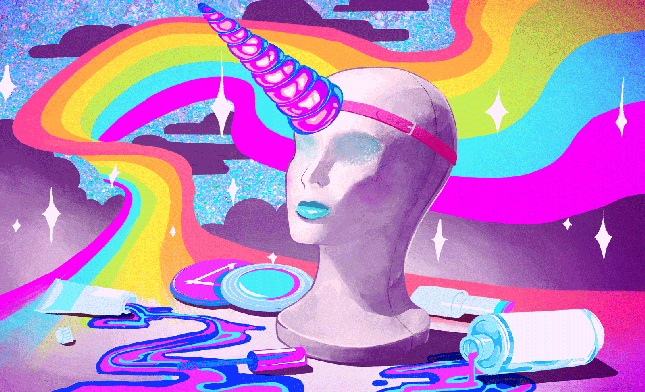The Beauty Industry Has a Unicorn Problem
Latest

Unicorns no longer just have the power to counteract poison. Now, they can make your cheekbones pop.
Lately, beauty companies have begun to create a truly unhinged amount of unicorn-themed makeup, and the only qualification seems to be each product’s goal to make the consumer both shiny and a little manic.
In case your brain isn’t also a melted beauty blog, let’s consider together the sheer number of products and overwhelming rate at which they are being introduced. Here’s Refinery29’s list of 15, PopSugar’s list of 50, and a nail polish by Christian Louboutin. According to statistics from Pinterest, “unicorn makeup brushes” have been saved over 35,000 times. When just buying the products isn’t enough, one can transform directly into a unicorn oneself thanks to one of YouTube’s over 6,400 unicorn beauty tutorials. Myth states that it takes a bare-breasted female virgin to catch a unicorn. Today, we’re allowed to keep our shirts on, but we need to be hot and mythical.
Your product can be named after a unicorn, shaped like a unicorn, make you look like a unicorn, or ideally all of the above. But if it’s too on-the-nose to conflate a mythical creature with pretty girls, no one seems to mind. Instead, it’s a shallow shorthand for empowerment. When uniqueness becomes commodified, we all end up wearing glitter.
We can trace unicorn beauty in the post-truth era over a timeline of viral products. Each product’s use and availability—most of these are out of stock more often than in—is completely nebulous for anyone who doesn’t spend all of their time on the niche beauty web. In late 2015, Too Faced launched Unicorn Tears, a lipstick with a slightly holographic sheen. April 2016 brought us UK-based brand Unicorn Lashes and their horn-shaped, rainbow-bristled brushes. (“THEY SOLD OUT IN LESS THEN [sic] 12 HOURS TWICE!!!” the website screams.) By September, the must-have product was Wet N Wild’s new rainbow highlighter in “Unicorn Glow.” And in between were the unicorn makeup bags, mugs, and this soap dispenser that reads, “Unicorns Are Awesome. I Am Awesome. Therefore I Am A Unicorn.” In an oddly gruesome twist, products are often named after dismembered unicorn parts. Unicorn Fur is a mauve shade of matte lipstick and Unicorn Horn is a holographic nail polish. Jeffree Star sells unicorn blood. FCTRY is trolling us with a glitter gel named unicorn snot. There’s something too real in branding that leaves us tearing a unicorn limb from limb or making one cry for a lewk. The unicorn is a look as deeply earned as a ten-step skin care routine, with the added bonus that everyone can tell how much work you’ve put in.
-

-

-

-

-

-

-

-

-

-

-

-

-

-

-

-

-

-

-

-

-

-

-

-

-

-

-

-

-

-

-

-

-

-

-

-

-

-

-

-








































